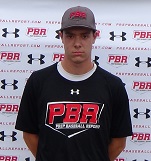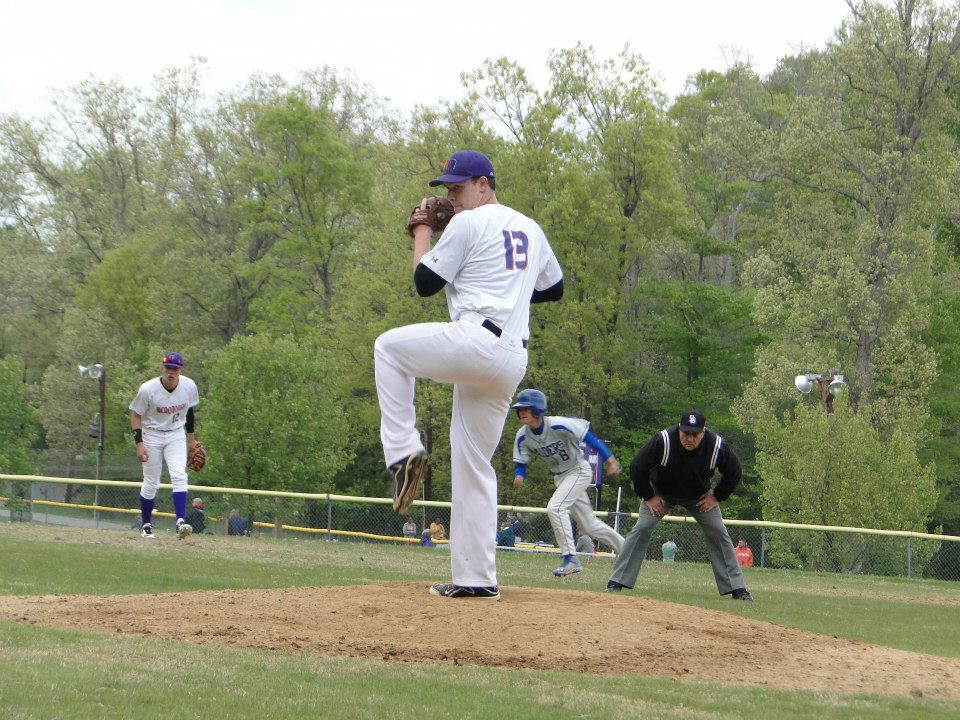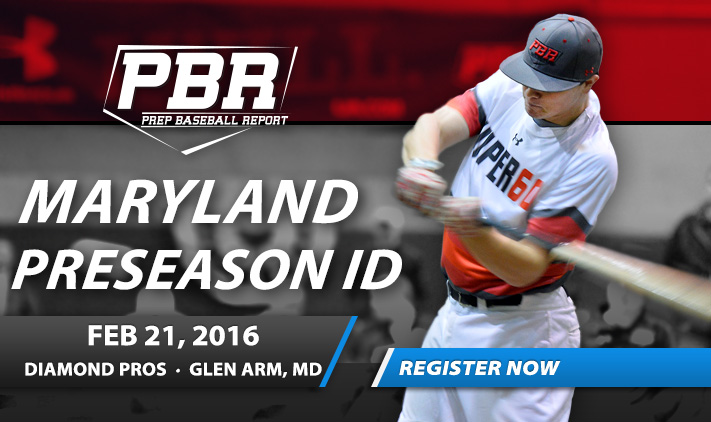Q&A with Worchester Polytechnic Institute commit David Larson
January 28, 2016
Follow @PBRMaryland
Facebook & Instagram
By Jerry Shank
Maryland Scouting Director
PBR Maryland strives to be the most comprehensive source of player information across the state. The Prep Baseball Report is the No. 1 resource for high school baseball in each state we cover through our variety of events, boots-on-the-ground scouting staff, daily coverage, and multimedia platforms. Our multimedia platforms and events work in tandem, ultimately creating the most powerful source of high school baseball promotion in each state. While other organizations take a national approach, our goal is to become the authoritative voice on the ground level of each state.
Interested in attending a PBR Maryland event? Check out our schedule by CLICKING HERE.
Interested in subscribing to Prep Baseball Report? CLICK HERE.
Today we chat with Worchester Poly Tech commit RHP/1B David Larson of McDonough.
 Name: David Larson
Name: David Larson
Position: RHP/1B
Class: 2016
Ht/Wt: 6-foot-2, 205-pounds
HS: McDonough
PBR Rank: No. 36 in MD Ranks, No. 11 RHP
Scouting Report
6.30.15 - Lanky and athletic frame at 6-foot-2 205-pounds. Has a short arm action from a low ¾ arm angle. Makes consistent throws with carry on them from the turn at first base and got up to 67 mph. Hits from a slighty open set up with a short and quick stride. Level swing path and some bat speed. Pull side power. Gap-to-gap approach. Good balance and rhythm in swing. 4.78 home to first time and an exit velocity of 87 mph. Good athlete around the bag at first that also pitches. Throws from a high ¾ arm angle with some arm speed. Loose arm action and slight wrap. Pitches with easy effort. Smooth rhythm and stays in line with a square finish. Fastball was straight at 80-84 mph. Breaking ball 10/4 movement with tight rotation and near fastball arm speed at 70-72 mph.
What made the WPI the right fit for you?
+ I was born in Connecticut and have lots of family living there. For a while now I have been interested in going back up north to go to College. WPI, in Massachusetts, is a very prestigious engineering school which fits perfectly with my interest in Computer Science as a major. Also, I have always had an academics-first mindset, and upon meeting Coach Mike Callahan of WPI, I learned that he has a very similar mindset for his players. He believes that if a player is not doing well in the classroom he will not be doing well on the field. I also had the privilege of meeting some of the players on an overnight visit and seemed to click right away with them. I think I will fit in perfectly at WPI in the fall.
What was the recruiting process like for you?
+ The recruiting process was sort of a big circle for me. I knew off the bat I wanted to go up north for college, so I made a list of colleges I would take campus tours of just to get a feel for them, WPI included. I emailed the coaches of all the schools I would tour, and only heard back from one, Mike Callahan. At this point I had not yet realized that WPI was such a good fit for me, so I continued going to camps and showcases around the Maryland area. All this time I had been in steady contact with Coach Callahan from WPI. This past summer I went to a camp in Massachusetts, where Coach Vinny Penell, Callahan's assistant coach, saw me play for the first time. At that point a strong relationship between me and Coach Callahan developed and would be followed by several campus visits and finally my commitment.
What other schools did you consider?
+ Frostburg State University, UMD, UMBC, Towson, UCONN
What were key factors you were looking for in your college decision?
+ As stated above, I wanted to go up north for college. Also, I wanted to enjoy my college baseball experience, as chances are it will be my last four years playing competitive baseball. I found that going Division III would allow me to both be a pitcher and have an opportunity to hit. It would also allow me to come in and be a part of the team as a freshman instead of having limited playing time like I would as a freshman at a Division I school. I also wanted a coach who is very laid back and positive towards his players, and Coach Callahan personifies laid back and positive. Finally, the prestige of WPI in the engineering field will help me to secure a good job out of college, as WPI graduates are highly sought after by big companies.
 What are your goals now before you graduate?
What are your goals now before you graduate?
+ I hope to finish out high school strong both academically and athletically. For academics I hope to maintain my straight A average. For baseball, I hope to build on the breakout year McDonough had last year. I am very confident that we have a strong chance to not only return to the state finals, but win them this year. After all, there's no better way to go out than with a championship.
When did things start to pick up in the recruiting process?
+ Things began to pick up when I went to the camp in Massachusetts and got exposure to the WPI coaching staff. I think then they realized that I would be a great fit to the program, and the relationship then began to grow and become more serious. I was then invited to visit the campus, meet the players and had other such opportunities. I think the recruiting process really took off from that moment.
What are you going to bring to WPI as a freshman?
+ I consider myself to be a reliable and consistent option as a pitcher. As a freshman I don't know that I will be dominant against older college players, but I will be a consistent guy who can eat up innings. I don't know if I will be a starter or come out of the bullpen, but I think either way I can provide solid support for the older more established pitchers.
Who is the best player you have played against?
+ The best player I have played against is probably one of a) Jaret Bennett, b) Ljay Newsome, or c) Andrew Wanger. All three were (and Jaret and Andrew still are) dominant pitchers in high school. Last season, Jaret pitched against us in the state semifinals. A lefty from Colonel Richardson throwing mid 80's with a nasty breaking ball, he was as tough of a challenge as they come for us. He could also put a hurting on the ball as a hitter too. Ljay I only faced one time, but he was the best player in my high school conference. Being drafted by the Mariners out of high school, it goes without saying that he was one of the best pitchers in Maryland. Finally, Andrew Wanger from Brunswick pitched a complete game shutout against us in the state finals last season. He was untouchable, holding our team to something along the lines of 1 or 2 hits for the whole game. I have nothing but respect for him and I hope to see him next year throwing against us again in the finals.
What summer program did you play for and what did you learn with them?
+ I played for the Maryland Monarchs over the summer. This is perhaps one of the best coaching staffs I have ever played for. The organization holds a huge amount of prestige having won a few national championships under the leadership of Bernie Walters. I learned too many things with the Monarchs to mention here. I find that after playing there for two fall and one summer season, I am a more refined and fundamentally sound player than ever before. I also learned a lot about the recruiting process, as the organization is also built on helping players like me find the right college for them and building relationships with coaches.
Do you have any advice for younger players beginning to/going through the recruiting process?
+ I would warn against getting caught up in what division a college is. Yes, there is a lot of hype and excitement around getting a Division I scholarship, or playing for a big name school like Vanderbilt or Virginia. But very few players get that opportunity. By all means, actively try to contact coaches from big name schools and seek exposure, but don't count out Division III from your list of colleges just because there are no athletic scholarships. Division III schools will have plenty of academic scholarship money, which brings me to my second point, work very hard in high school. Baseball in general doesn't give huge scholarships to student athletes, so you would be better off getting money from academics. This will also make you more attractive to coaches, as they can then use scholarship money on other guys. Finally, I would advise finding a place where you can still be happy even if you can't play baseball there. Injuries happen, and you don't want to be miserable if suddenly baseball is no longer a factor.
RECENT HEADLINES
-
PBRPlus - Jan 28, 2016
Super 60 Preview: Bloodlines, Repeats And Teammates -
PBRPlus - Jan 28, 2016
Ron Wolforth Webinar Series: The Danger of Following A One-Size-Fits-All Program -
MD - Jan 28, 2016
2016 Team Preview: Baltimore Poly Tech -
MD - Jan 27, 2016
Coaches Corner with Liam Bowen of UMBC -
MD - Jan 27, 2016
2016 Team Preview: Patterson Mill HS -
PBRPlus - Jan 27, 2016
The Hotlist: Class Of 2017 Winter Standouts

